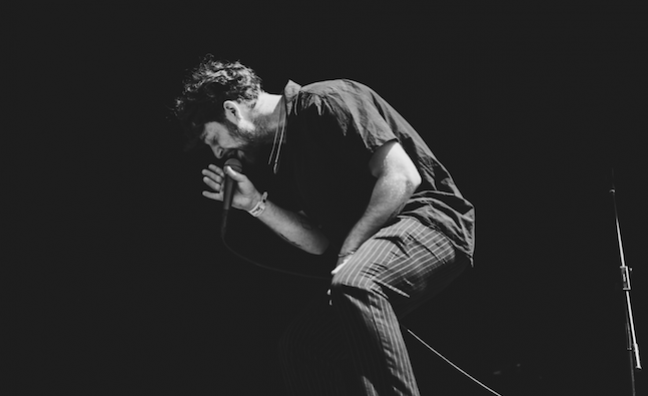One of just a handful of UK debut artists to score a Top 5 album this year, Tom Grennan continues his relentless live campaign at Reading & Leeds this weekend ahead of a big autumn tour. It follows a busy summer including an appearance at the inaugural Rize festival.
The Lighting Matches (Insanity Records) album has sales to date of 20,950, according to the Official Charts Company, and now there are plans to build upon that early promise. Here, Insanity Group’s CEO Andy Varley takes Music Week inside the singer-songwriter’s campaign and long term plans to cement his status as a career artist...
Are you happy with Tom Grennan’s Top 5 performance for his debut album?
Yes. absolutely! It’s quite interesting looking at some of the stats, because Tom is one of only four British artists to chart their debut album in the Top 5 this year. So I think for a young, British singer-songwriter when the whole of the industry seems to be talking about the fact that guitar music is dead and it’s all about the more Spotify-friendly, urban-tinged records, the fact that Grennan’s had a Top 5 album is amazing and I’m enormously proud of the team for delivering that.
Why has it become difficult for debut artists to sell albums?
I think so many people now are putting an emphasis on the success that you can garner for individual tracks with the help and support of streaming services. It’s tricky for labels and managers to build significant enough stories for their artists to enable them to build out as an artist proposition, as opposed to just having a single that is successful around the world. I think for us as a label, because we are really focused on building a culture for the label and building up those individual artists’ success stories, we have a much smaller number of artists signed to the label, so we can put more emphasis on what has traditionally been known as artist development. We work incredibly closely, for example, on the touring side of an artist’s career, so we work very closely with agents and managers to really build up significant numbers of hard tickets. If you look at someone like Tom Grennan, we’ve got 30,000 tickets in the market for his October tour and that includes a Brixton Academy date. That’s a statistic that we can use not just in the UK, but that we can use in other European markets.
If you’re wanting to build out meaningful, long-term artist propositions then putting out a body of work, certainly for someone like Tom Grennan, is supremely important. He will tour for the rest of this year and going into next year. And now having this Top 5 album gives us even more to take out when we are building in to the next single, with a view to continuing to sell that album well into Christmas.
Were you always targeting an album audience?
Yes, absolutely. I thought that Tom was exciting the day that I met him, and that was at a dingy little boozer in Finsbury Park. But once we signed him it was really really important that we delivered him, and that takes a lot of hard work – and a little bit of luck, too. But in terms of his hit singles, we haven’t had that yet. For us, with Tom, to achieve that Top 5 album without a significant radio hit, just shows me what is going to happen with Tom once we do have that hit. We’re actually going to revisit Found What I’ve Been Looking For, which has been synced to Sky Sports and it’s had 30 million-plus streams, and it’s been the one that’s performed super-well for us in Europe. We’ve not really properly pushed that as a single just yet – I think it was seized by Radio 1 when it was released quite some time ago, but apart from that we had very, very little radio support, so it feels now that we’ve got Tom really cemented as an album-selling artist, we know that there’s a fanbase there, and it’s our job as a label to deliver this album and open it up wider to his growing fanbase.
Is there anything you’d like to see happen to make the environment easier for guitar music?
Continuing the lifespan of an album now is slightly more challenging because of streaming platforms, and the fact that people can jump on to Spotify and Apple Music and they can pick and choose bits of those songs they want to listen to, almost as if they were singles. So I think that artist development period is somewhat extended. The key to it is just holding your nerve really and just believing in the artists that you sign. We don’t want to be that record label that people walk away from having had a bad experience with us, because maybe we’ve signed them and done nothing with them. When we are developing these artists, we are wanting to grow them and build them as brands. The music is the foundation, but the bricks and mortar is really in the live business which can really cement the artist in terms of their career.








